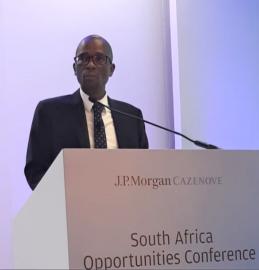
Further expansion of Value Added Tax (VAT) free – or zero rated – products is currently not on the cards for South Africa. However, government has implemented more targeted policies to benefit the poor.
This according to Deputy Minister of Finance, David Masondo, who was participating in Parliament’s mini plenary session on, amongst other topics, the high cost of living and measures government is taking to alleviate it.
Masondo told the session that additional VAT zero rating is not “the best instrument to address the problem of high cost of living”.
“Government has already VAT zero rated a number of basic foods. This includes the zero rating of illuminating paraffin and other items which was introduced in April 2001. Studies subsequently showed that suppliers did not pass on the benefit of the VAT relief to the consumers as it was intended. So it doesn’t follow that zero rating will lead to lower prices.
“The tax revenue that is lost from zero rated food items mostly flows to higher income households because this category…purchase more of the products that are zero rated. In fact, many analysts have demonstrated that in absolute mandatory terms, middle and higher income households benefit more from the zero rating than lower income or poor households,” he said.
Currently, VAT constitutes 26%, on average, of gross tax revenue in South Africa. That revenue is redistributed to the poor through various government programmes including social grants.
Masondo says a reduction in this revenue would have an impact on those who benefit from state driven programmes.
“Products that are zero rated are well targeted. Further zero rating will lead to VAT revenue loss which could be directed to the already existing pro-poor government programmes. Targeted cash transfer to the poor is better and more redistributive as opposed to VAT which benefits mostly high income households.
“In 2019/2020 fiscal year, R31 billion VAT revenue was forgone due to zero rated items. So we think that further zero rating will lead to the decline of revenue which could be used to support the poor,” Masondo said.
The Deputy Minister emphasised that although zero rating some items is well intended and necessary, “a social transfer system of assisting the poor through targeted expenditure interventions is much more desirable and better”.
“Recognising that zero rating is not the best instrument, government has instead implemented a number of policies to directly benefit lower income households through the expenditure side. Education and health budgets are progressive and extensive grant system of old age grants, the child support grant and the disability grant provide cash to households who are most in need.
“The Social Relief of Distress grant…is another new mechanism that government has used to provide this relief. This is a better approach than zero rating where so much of the benefit goes to higher earners and where companies may not even pass on the benefit to the consumers,” he said.
Masondo doubled down on his position – thrashing out other targeted interventions to assist cash strapped South Africans.
These include:
- The implementation of the temporary reduction in the general fuel levy last year which benefitted consumers to the tune of some R10.5 billion
- Added to that, the general fuel levy has not increased in the past two budgets
- The introduction of the Road Accident Fund levy for food manufacturers – which allows these manufacturers to apply for tax reduction which could reduce costs of food manufacturing
- Implementing reforms in the economy to bring prices of energy and rail and ports ccsts down which could increase growth and ultimately lead to the creation of more jobs
“This shows that government has been active in finding solutions to try and combat high prices without resorting to further zero rating,” he said. – SAnews.gov.za


